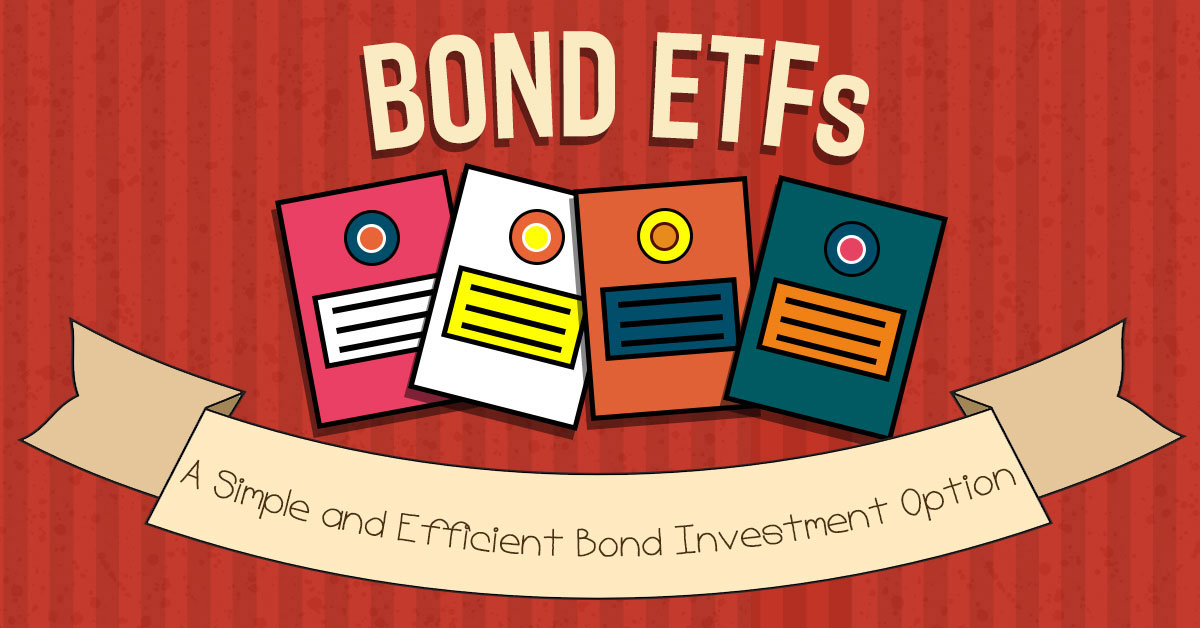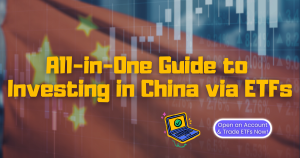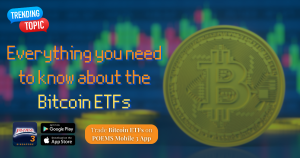Bond ETFs: Simple and Efficient July 6, 2022

Stocks, bonds, or both? When it comes to deciding what to invest, you may find yourself in a dilemma. There is no definitive answer to this question, as the two asset classes have diverse characteristics that address different needs.
But what if you are able to invest in a financial product that combines the advantages of both stocks and bonds? Well, here’s the good news – there is such a product readily available in the market!
Many investors may have not considered Bond Exchange Traded Funds (ETF). This unique financial product combines the benefits of stocks, bonds and funds into a single package – similar to instant coffee mixes!
Key Takeaways
- Institutions like corporations or governments raise money by issuing bonds, which can be bought by investors. There is also a large variety of bonds that can be used to diversify your portfolio and maintain a stable income.
- With bond ETFs, you can gain exposure to this variety without needing to invest in multiple single bonds. You are also less affected in a case where the company defaults and is unable to pay back the principal amount.
- SGX has several high yield bond ETFs that have a lower barrier to entry and can be easily invested in, from Singapore-based bonds to bonds in the Asia Pacific and China regions.
What is the difference between stocks and bonds?
When you invest in stocks, you become part-owner of a company, with a stake in the company’s assets, performance, profits, decision-making process etc. However, as a bond investor, you are essentially lending money to a company in return for promised payment of the principal amount at maturity, and an agreed-upon interest payment.
As a result, stocks are seen as a high-risk-high-return asset class, while bonds are often regarded as a safer investment option because of a repayment of the principal at maturity.
So, why do some investors prefer bonds over stocks?
Besides being the safer of the two asset classes, there are other reasons that make bonds a more appealing option for investors.
1. Variety
There is a wide variety of bonds on the market; from government bonds, quasi-government bonds to corporate bonds. Different bonds are structured differently with differing maturities, coupon rates, coupon payment frequencies and credit ratings.
Below are examples of Singapore bonds that you may be familiar with.
Types of Singapore Bonds
| Bonds | Description | Advantages | Disadvantages |
| Treasury Bills | Short-term marketable debt securities issued by Monetary Authority of Singapore (MAS), with maturity of one year or less. | – Short-term holding period– High credit rating– Can be sold in the secondary markets to other investors by authorized dealers bank– Investment amount starts from as low as $1000 | – Low return– Zero coupon payment. Sold at a discount to par value, with payment of par value at maturity |
| Singapore Government Securities (SGS) | Longer-term marketable debt securities, with varying maturities, issued by MAS | – Different maturities to match the investment horizons of investors– High credit rating– Can be sold in the secondary markets to other investors by authorized dealers bank– Low investment amount of $1000 | – Low coupon rates, with a fixed semi-annual payment frequency |
| Singapore Savings Bond (SSB) | 10-year bond issued by MAS and backed by the Singapore Government | – High credit rating– Low investment amount, with minimum subscription amount of $500– Redeemable any time before bond maturity, with no early redemption penalty | – Low coupon rates, with a fixed semi-annual payment frequency– Total amount of SSB held across all issues cannot be more than $200,000 for each individual |
| Quasi-Government Bond | Debt securities issued by quasi-Singapore Government entities such as HDB, LTA and PSA | – Different maturities to match the investment horizons of investors– High credit rating– Higher interest rates as compared to T-bills and SGS | – Sold in denominations of $250,000 and may be inaccessible to general retails investors |
| Corporate Bonds | Debt securities issued by corporations to raise capital for its business activities | – Higher coupon rates as compared to government bonds with similar credit ratings to compensate investors for additional risk taken– Differing credit rating and maturity to match risk profile and investment horizons of investors– Coupon rates depend on credit ratings of bonds– Retail bonds can be bought/sold through exchanges– Retail bonds can be bought for as low as $1000 | – Most corporate bonds are transacted Over the Counter (OTC) through banks or specialised brokers.– Most OTC bonds in Singapore are sold in denominations of $250,000 and only available to accredited investors– Risk of bond default if corporations are unable to meet debt obligations– Bond prices susceptible to company’s performance |
For more information on T-bills, SGS and SSBs issued by the Singaporean government, please click here.
2. Stable and Predictable Cash Flows
Unlike stocks, which are not obligated to pay dividends; details of coupon rates, payment dates and maturity are usually stipulated at the time of bond purchase.
Bondholders can receive a steady and visible flow of coupon payments to supplement their passive income. Many investors also use bonds as a form of capital preservation as the bond issuer will repay the principal amount at maturity, while receiving coupon payments in the process.
Stocks do not have maturity dates but there is no guarantee that investors can recover the principal amount invested as stock prices may fall below the purchase price.
3. Hierarchy of Claims
In the event of liquidation, bondholders are higher on the priority list concerning claims to a company’s assets over stockholders, thereby increasing the likelihood that they can recover the principal amount invested.
4. Portfolio Diversification and Stabiliser
Generally, bonds have low performance correlation with stocks, making them an excellent asset class to balance higher-risk stocks in a portfolio. In times of market downturn, bonds can deliver steady and predictable cash flows to help investors soften the impact of fluctuating portfolio performance.
What are bond ETFs?
Now that we know what bonds are about, we can introduce you to Bond ETFs.
Other than investing in bonds directly, investors can gain exposure to bonds through Bond ETFs. A Bond ETF is basically a pooled investment vehicle that holds a portfolio of bonds. It aims to track an index of bonds and tries to replicate the index performance. Unlike most corporate bonds, which are traded OTC, Bond ETFs trade on exchanges like stocks, giving them the additional advantage of intraday tradability.
Why choose bond ETFs over just bonds?
Even though Bond ETFs and bonds are comprise of the same investment principles, the exchange-trading mechanism and fund structure of Bond ETFs offer several advantages over single bond investments.
1. Diversification
With a Bond ETF, you can gain exposure to a portfolio of bonds. In the event of a bond-default, you will not lose the entirety of your investment, as there are other bonds inside the ETF to cover its position and help you minimise your losses.
2. Liquidity, Flexibility and Ease of Trading
Bond ETFs are listed and traded on exchanges. You can buy or sell Bond ETFs whenever the exchanges are open with a regular brokerage account. It’s as simple as clicking a button!
Prices are transparent and you do not have to source for a specialised bond broker to execute your transaction. Corporate bonds which are traded OTC may be illiquid and inaccessible to investors.
3. Low Barriers to Entry
Most Corporate Bonds which are traded OTC are sold in denominations of $250,000 and are only available to accredited investors.
Bond ETFs can be bought or sold for as low as one board lot on exchanges. They share the same brokerage fees as stocks and represent a good entry point for retail investors intending to add bonds into their portfolio.
4. Rebalancing of Holdings
Bond ETFs do not have maturity dates and investors can hold onto them indefinitely. At any given time, some of the bonds inside a Bond ETF may be approaching maturity or exiting the age range that the Bond ETF is targeting. Hence, the Bond ETF will continuously rebalance itself to comply with the index objective that it is replicating.
As Bond ETFs do not have maturity dates, there is a possibility that investors may suffer capital loss if they sell off the ETF at a lower price than they originally bought it for.
What are some bond ETFs you can consider investing in?
There are several Bond ETFs currently listed on SGX:
Singapore Bonds
| ETF | ABF Singapore Government Bond Index Fund | Xtrackers II Singapore Government Bond UCITS ETF | Nikko AM SGD Investment Grade Corporate Bond ETF |
| Stock Code | A35 | KV4 | MBH |
| Primary Currency | SGD | SGD | SGD |
| Inception Date | 31 August 2005 | 17 May 2010 | 27 August 2018 |
| Asset Under Management | SGD 952.30 Million | SGD 126.45 Million | SGD 561.02 Million |
| Expense ratio | 0.24% | 0.20% | 0.47% |
| Number of Holdings | 53 | 21 | 112 |
| 12 Month Dividend Yield | 2.336 | Reinvested | 2.90% |
| Dividend Distribution Frequency | Semi-Annually | N/A | Annually |
| Strategy | Government | Government | Aggregate |
| Geographical Focus | Singapore | Singapore | Singapore |
Information Accurate as of 17 June 2022
Global Bonds
| ETF | iShares J.P. Morgan USD Asia Credit Bond Index ETF | iShares Barclays USD Asia High Yield Bond Index ETF | ICBC CSOP FTSE Chinese Government Bond Index ETF |
| Stock Code | QL2 and N6M | QL3 and O9P | CYC and CYB |
| Primary Currency | USD | USD | RMB |
| Inception Date | 2 June 2011 | 5 December 2011 | 21 September 2020 |
| Asset Under Management | USD 70.30 Million | USD 2.08 Billion | RMB 9.34 billion |
| Expense ratio | 0.35% | 0.50% | 0.25% – 0.30% |
| Number of Holdings | 342 | 303 | 55 |
| 12 Month Dividend Yield | 1.87% | 3.91% | 1.0420% |
| Dividend Distribution Frequency | Quarterly | Quarterly | Annually |
| Strategy | Aggregate | Aggregate | Government |
| Geographical Focus | Asia Pacific Region | Asia Pacific Region | China |
Information Accurate as of 17 June 2022
Nikko AM SGD Investment Grade Corporate Bond ETF
Nikko AM SGD Investment Grade Corporate Bond ETF is Singapore first’s Investment Grade Corporate Bond ETF. Investment grade credit rating indicates a low risk of credit default, making Investment Grade Corporate Bonds a relatively safe investment vehicle for investors.
Historically, Corporate Bonds are traded OTC in large notional amounts and are out of reach for most retail investors. With the Nikko AM SGD Investment Grade Corporate Bond ETF, investors can now have easy and low-cost access to corporate bonds.
The Nikko AM SGD Investment Grade Corporate Bond ETF provides investors with:
- Low-cost Easy Access to SGD Investment Grade Corporate Bonds
- Diversification of Portfolio Risk
- Flexibility and Intraday Tradability on Exchange
ICBC CSOP FTSE Chinese Government Bond Index ETF
ICBC CSOP FTSE Chinese Government Bond Index ETF is the first ETF listed on SGX with direct access to China’s onshore bond market. It is the world’s largest Chinese pure government bond ETF and has an initial Asset under Management (AUM) of over USD 675 million.
China’s bond market, valued at USD 15 trillion, is the second largest bond market in the world. The inclusion of China onshore bonds into global bond indices is likely to attract about USD 320 billion of inflows into China’s onshore bond market in aggregate.
The ICBC CSOP FTSE Chinese Government Bond Index ETF provides investors with:
- Exposure to high quality Chinese government bonds – rated A1/A+ by Moody’s/S&P
- Higher yield relative to bonds from other major economies
- Diversification benefits – low correlation of onshore China government bonds vs. other major government bond indices globally
Conclusion
For most retail investors, buying individual corporate bonds is out of the question. Treasury-Bills, SGS and SSB are typically considered as risk-free investments but with lower returns.
Bond ETFs offer variety, diversification, liquidity and price transparency that single bond investments cannot match. All things considered, Bond ETFs are probably a better and more convenient option for investors looking to diversify their portfolio.
Moreover, there are several settlement methods for Bond ETFs listed on SGX. The ABF Singapore Government Bond Index Fund is available via the CPF Investment Scheme (CPFIS). All SGX listed ETFs are eligible for settlement using the Supplementary Retirement Scheme (SRS) Funds.
Disclaimer
These commentaries are intended for general circulation. It does not have regard to the specific investment objectives, financial situation and particular needs of any person who may receive this document. Accordingly, no warranty whatsoever is given and no liability whatsoever is accepted for any loss arising whether directly or indirectly as a result of any person acting based on this information. Opinions expressed in these commentaries are subject to change without notice. Investments are subject to investment risks including the possible loss of the principal amount invested. The value of the units and the income from them may fall as well as rise. Past performance figures as well as any projection or forecast used in these commentaries are not necessarily indicative of future or likely performance. Phillip Securities Pte Ltd (PSPL), its directors, connected persons or employees may from time to time have an interest in the financial instruments mentioned in these commentaries. Investors may wish to seek advice from a financial adviser before investing. In the event that investors choose not to seek advice from a financial adviser, they should consider whether the investment is suitable for them.
The information contained in these commentaries has been obtained from public sources which PSPL has no reason to believe are unreliable and any analysis, forecasts, projections, expectations and opinions (collectively the “Research”) contained in these commentaries are based on such information and are expressions of belief only. PSPL has not verified this information and no representation or warranty, express or implied, is made that such information or Research is accurate, complete or verified or should be relied upon as such. Any such information or Research contained in these commentaries are subject to change, and PSPL shall not have any responsibility to maintain the information or Research made available or to supply any corrections, updates or releases in connection therewith. In no event will PSPL be liable for any special, indirect, incidental or consequential damages which may be incurred from the use of the information or Research made available, even if it has been advised of the possibility of such damages. The companies and their employees mentioned in these commentaries cannot be held liable for any errors, inaccuracies and/or omissions howsoever caused. Any opinion or advice herein is made on a general basis and is subject to change without notice. The information provided in these commentaries may contain optimistic statements regarding future events or future financial performance of countries, markets or companies. You must make your own financial assessment of the relevance, accuracy and adequacy of the information provided in these commentaries.
Views and any strategies described in these commentaries may not be suitable for all investors. Opinions expressed herein may differ from the opinions expressed by other units of PSPL or its connected persons and associates. Any reference to or discussion of investment products or commodities in these commentaries is purely for illustrative purposes only and must not be construed as a recommendation, an offer or solicitation for the subscription, purchase or sale of the investment products or commodities mentioned.
About the author
Mr. Joel Lim
ETF Specialist
Joel graduated from Singapore Institute of Management, University of London with a First Class Honours in Business. He was the recipient of SIM University of London’s Top Student Bronze Award in 2017 and was the worldwide examination topper for the “Financial Management” module in 2016. Joel was also commended by University of London for his excellent performance in the 2014 Examinations.
Joel is involved in ETF education, providing trading ideas and support to traders, dealers and fund managers. Joel also works closely with ETF issuers to educate retail investors about new ETFs during the Initial Offering Period.

 All-in-One Guide to Investing in China via ETFs
All-in-One Guide to Investing in China via ETFs  Everything you need to know on Bitcoin ETFs
Everything you need to know on Bitcoin ETFs  Maximising your Tax Savings & Retirement Funds with SRS in Singapore
Maximising your Tax Savings & Retirement Funds with SRS in Singapore  Is There a “Fairest of Them All”?
Is There a “Fairest of Them All”? 









